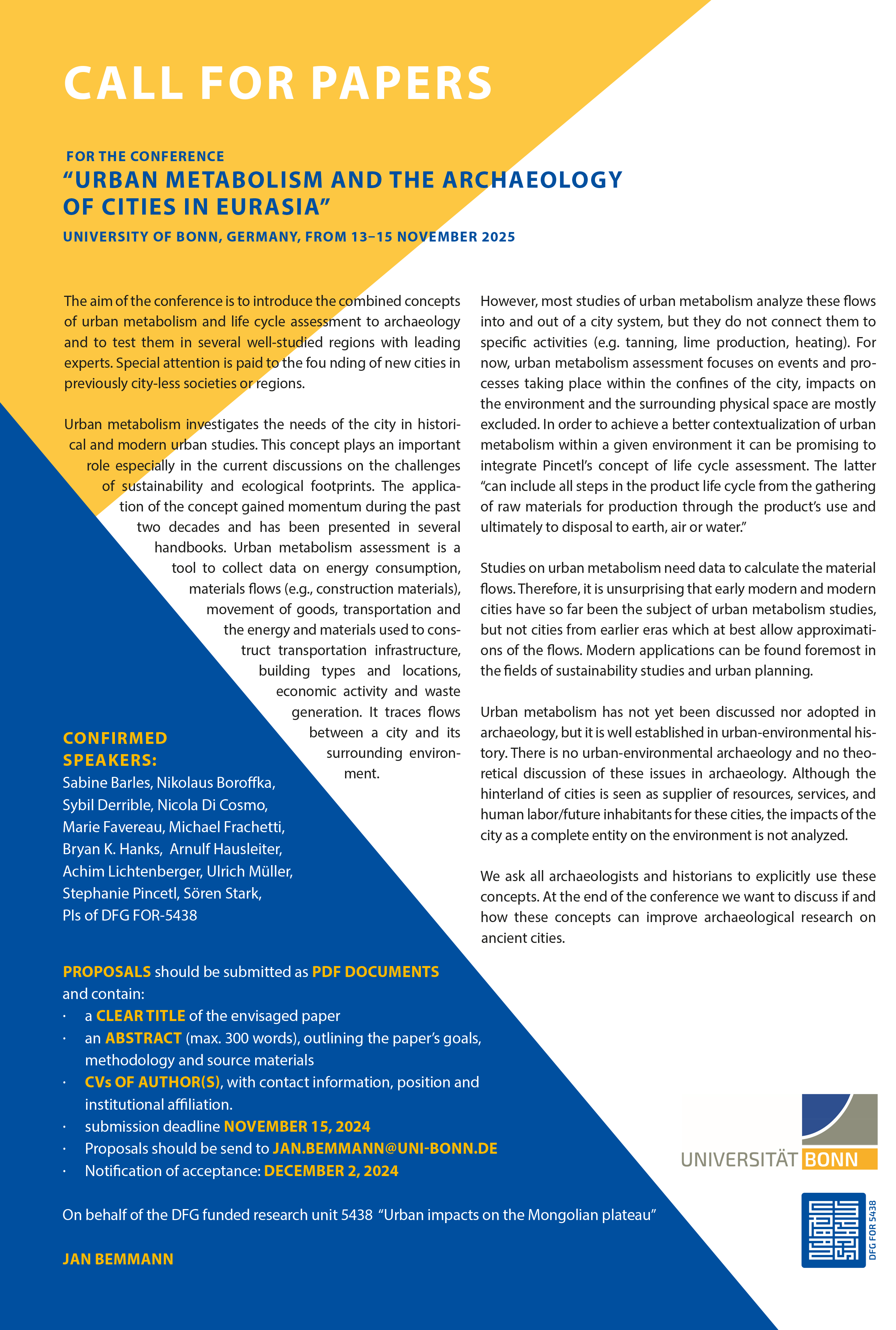The University of Bonn, Germany, is issuing a call for papers for their conference on "Urban Metabolism and the Archaeology of Cities in Eurasia" with a deadline of Nov 15, 2024.
The aim of the conference is to introduce the combined concepts of urban metabolism and life cycle assessment to archaeology and to test them in several well-studied regions with leading experts. Special attention is paid to the founding of new cities in
previously city-less societies or regions. Urban metabolism investigates the needs of the city in historical and modern urban studies. This concept plays an important role especially in the current discussions on the challenges of sustainability and ecological footprints. The application of the concept gained momentum during the past two decades and has been presented in several handbooks.
Urban metabolism assessment is a tool to collect data on energy consumption, materials flows (e.g., construction materials), movement of goods, transportation and the energy and materials used to construct transportation infrastructure, building types and locations, economic activity and waste generation. It traces flows between a city and its surrounding environment.
However, most studies of urban metabolism analyze these flows into and out of a city system, but they do not connect them to
specific activities (e.g. tanning, lime production, heating). For now, urban metabolism assessment focuses on events and processes taking place within the confines of the city, impacts on the environment and the surrounding physical space are mostly
excluded. In order to achieve a better contextualization of urban metabolism within a given environment it can be promising to
integrate Pincetl’s concept of life cycle assessment. The latter “can include all steps in the product life cycle from the gathering of raw materials for production through the product’s use and ultimately to disposal to earth, air or water.”
Studies on urban metabolism need data to calculate the material flows. Therefore, it is unsurprising that early modern and modern cities have so far been the subject of urban metabolism studies, but not cities from earlier eras which at best allow approximations of the flows. Modern applications can be found foremost in the fields of sustainability studies and urban planning.
Urban metabolism has not yet been discussed nor adopted in archaeology, but it is well established in urban-environmental history. There is no urban-environmental archaeology and no theoretical discussion of these issues in archaeology. Although the hinterland of cities is seen as supplier of resources, services, and human labor/future inhabitants for these cities, the impacts of the city as a complete entity on the environment is not analyzed. We ask all archaeologists and historians to explicitly use these concepts. At the end of the conference we want to discuss if and how these concepts can improve archaeological research on ancient cities.
Confirmed Speakers:
Sabine Barles, Nikolaus Boroffka, Sybil Derrible, Nicola Di Cosmo, Marie Favereau, Michael Frachetti, Bryan K. Hanks, Arnulf Hausleiter, Achim Lichtenberger, Ulrich Müller, Stephanie Pincetl, Sören Stark, PIs of DFG FOR-5438
PROPOSALS should be submitted as PDF DOCUMENTS
and contain:
· a CLEAR TITLE of the envisaged paper
· an ABSTRACT (max. 300 words), outlining the paper’s goals,
methodology and source materials
· CVs OF AUTHOR(S), with contact information, position and
institutional affiliation.
· submission deadline NOVEMBER 15, 2024
· Proposals should be send to JAN.BEMMANN@UNI-BONN.DE
· Notification of acceptance: DECEMBER 2, 2024
On behalf of the DFG funded research unit 5438 “Urban impacts on the Mongolian plateau”
JAN BEMMANN

